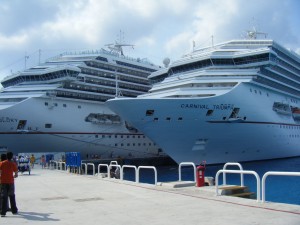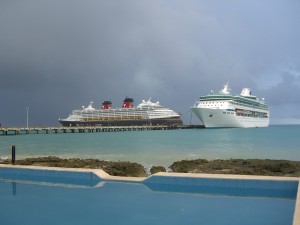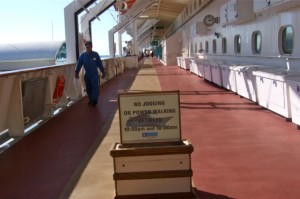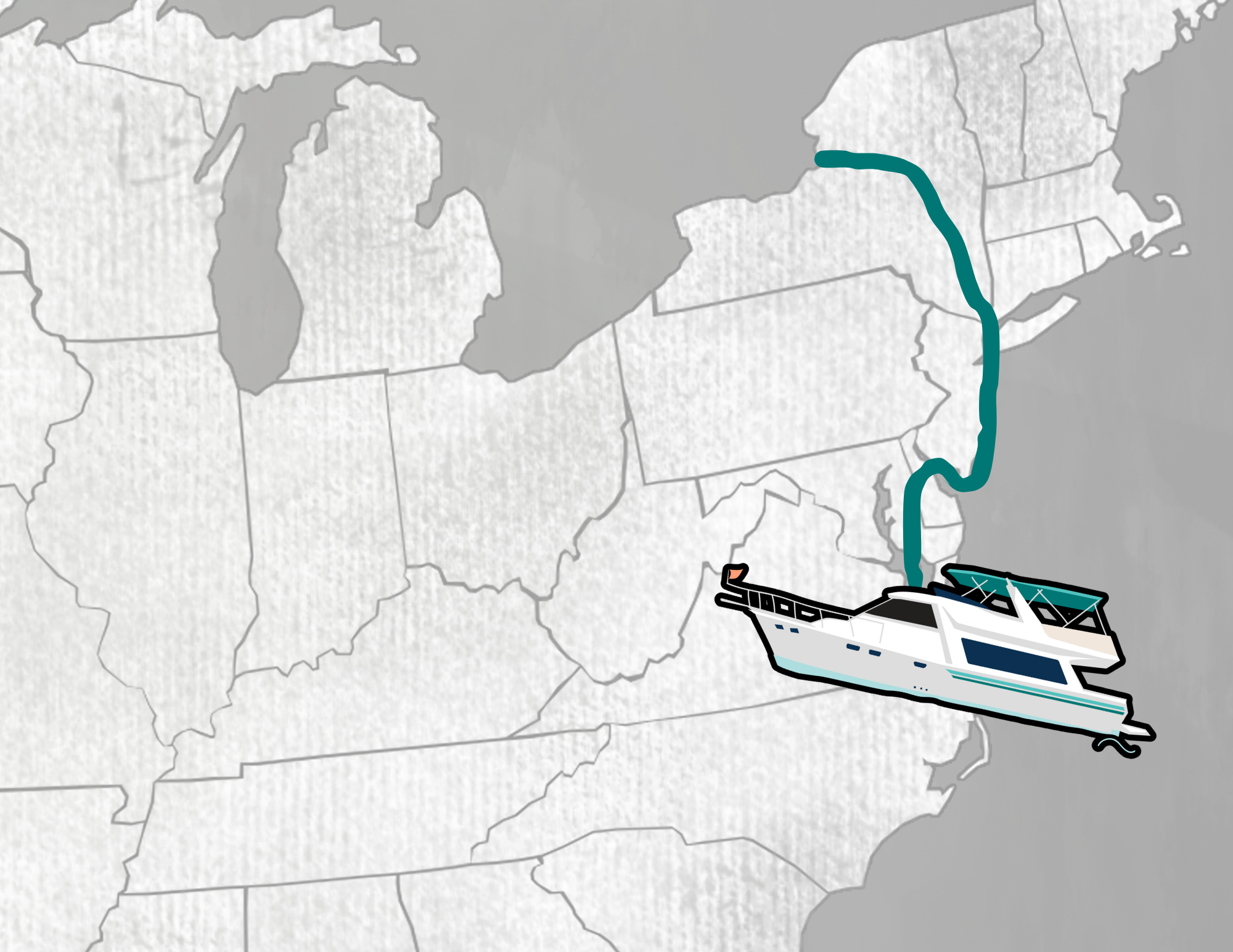Note: This is a rare guest post from our friend Marc – who has found a different way of scratching his wanderlust and career passions by working aboard cruise ships. We asked him to share what his version of nomadic life is like.
==========
Several years ago, I decided to pursue a full-time career in the performing arts as a technician.
Though I initially had a hard time finding enough steady work, as I gained a small standing in the tech community I was able to pick and choose among the gigs that came my way. And while I loved the variety and travel that came from freelancing, I didn’t enjoy the feast-or-famine economics. But when I took on a full time gig at a large local theme park, I learned one thing — for me, the security of full-time employment was not worth the monotony of working the same show at the same venue, day in and day out.
Fortunately, a friend of mine introduced me to the cruise industry.
Many full-time travelers may scoff at embracing nomadic life via cruise ship, and I don’t blame them. I call it ”Nomad Lite.” A light beer may have half the calories, but you also only get half the buzz. Likewise, there are several trade-offs for the nomad in choosing life aboard a cruise ship.
Saccharin Freedom – The Downside
 Life aboard ship is a dream-come-true for me, but every dream has it’s moments of finding yourself naked in class.
Life aboard ship is a dream-come-true for me, but every dream has it’s moments of finding yourself naked in class.
Let’s start with major downsides: limited destinations and exploration time, dealing with tourists, claustrophobia, and lots of corporate crap.
No, you can’t drive the big boat. Your route is fixed, and repetitive. For the next six months, we’re going to St. Thomas, Antigua, Ocho Rios, Grand Cayman and then back to Miami. Then we’re going to do it again. And again.
And the whole time, we’re not stopping anywhere for more than 8 to 15 hours. You have to get used to the idea that exploration can be achieved piecemeal as the ship returns to the same port on a regular basis.
Dealing with a new group of tourists every week can tax the most patient of people-persons. Many guests come aboard with a theme park mentality — the mindset that they can treat you like crap because they will never see you again. Fortunately, most realize by the second or third day that the ship is not as large as they first thought, and they actually have to live with you for a week. And of course, there are crew areas unaccessible to guests.
Getting some “me-time” is something we all need, and it is not always possible on a cruise ship. Some crew members are assigned quarters with a roommate which can make private time especially rare!
Escaping corporate drudgery is one of the main drives for many of us to become nomads. Unfortunately, a corporation bought this behemoth of a ship for us to ride in, so we gotta abide by their rules, not to mention abiding by maritime law. Boat drills, classes on safety, smiling seminars, the corporate “Vision”, first aid, conservation class … the first three weeks are non-stop classes.
… But Saccharin Won’t Rot Your Teeth – The Upside
Now that we’ve cracked the spiky shell of our rock lobster, let’s enjoy the meat. The positive aspects of living oboard ship include: travel, contractual benefits, camaraderie, amazing job training and a full wallet.

Traveling around the world is a perk for any nomad; that goes without saying. And on a cruise ship, you are traveling non-stop.
Most ports have crew-only bars and internet cafes as well as crew discounts for scooter rentals, scuba gear, food … you name it. And despite your short visits, you can still get to know some of the locals or venture off with a bunch of fellow crewmates for a mini-excursion away from the tourists. And some cruise liners swap routes regularly during a contract, giving you more destination variety.
It is expensive to hire and train a crew member, so the company will do almost anything to get a good crew member to sign on for another contract. In particular, extra job training is always available. While on my first contract, I received training that would have cost thousands of dollars had I chosen to do so on land. The more a crew member knows, the more valuable he is.
The benefits are good — including 100% medical coverage at absolutely no cost to the crew member. Typical contracts also gives many benefits to the crew member who chooses to stay aboard as a lifer like a hefty pension plan, overtime pay for extra duty, and an obscene amount of paid vacation for some staff members.
Cruise lines perform extensive background checks and interviews to weed out those who may not play well with others. The result is a trusting community of unlocked cabin doors, returned wallets (with cash still in them) and a next-door-neighbor feeling rarely experienced on land nowadays. The people who choose life at sea form close bonds easily, and though separation is frequent, the bonds are never broken.
At first glance, the cruise paycheck seems a bit low for the skills one brings. But a few weeks at sea brings the realization: it is almost impossible to spend money on a ship! There is no rent. There is no power bill. There is no car/health/life insurance, car payment, food bill, laundry bill, cleaning bill, grocery bill, laundry service or gasoline to buy. The only expenses one might have onboard are optional and cheap – alcohol, cigarettes and gourmet coffee. A frugal crew member can sock away a pretty good amount of money.
Getting Aboard
The requirements for getting a job on a cruise liner are rigorous. One must be willing to go through an extensive medical exam including full blood work, drug screen, chest x-ray … the whole nine yards, at the crew candidate’s expense.
The candidate must also be able to pass an extensive background check, have a valid passport and the ability to obtain proper visas. The interview process is long and tedious. The ability to pick up and go at a moment’s notice is a huge plus.
Of course, it always helps to know someone; but it is not a necessity. Cruise lines usually have a link to recruiters at the bottom of their web pages.
Living Light & Other Thoughts

Most nomads prefer to travel light, and the cruise lines cater to this lifestyle choice. It is possible to travel between contracts with one or two medium sized bags and still want for very little. Clothing, a camera, a small laptop and a cell phone are all that is truly required to enjoy a life at sea. DVD players, televisions, video game consoles, stereos and a host of other electronics are usually left in your cabin by the last person who vacated it. This is done with the understanding that the next cabin he or she will occupy will probably have all these things anyway, so why carry it? DVD’s and games are scattered throughout the ship in different cabins, and a short note on a public dry-erase board will probably net you whatever you desire in less than a day.
Many port cities have land nests — communal apartments rented by several crew members who rotate living arrangements while not aboard ship. Some officers even purchase houses with the same arrangements. If one is fortunate enough to be in such an arrangement, you can count on having a home base in an awesome vacation spot. Anyone who violates the trust of the understood cleaning arrangements will likely never again be invited to stay at another land nest.
My first senior technician at sea told me, ”It takes a certain personality to do this. Not better or worse — just a certain type.”
I wouldn’t trade it for the world, and it has opened the world to me.
Marc is now deep in his second 6 month contract, lighting up stages while sailing the Mediterranean Sea.


I work on a cruise ship as well. I would agree with most things – except that it’s always easy to spend money if you’re not careful (ie. booze, souvenirs, clothes, tours) and stuff does get stolen if you leave it lying around.
I enjoy cruise ship life but it’s not paradise, it’s still work!
I liked your post. I’ve always been on the other side of the counter – the tourist but I can appreciate how tough it is for cruise staff to be operating the same route over and over. I’m sure that it can get quiet tedious at times.
That was really informative and interesting. ,